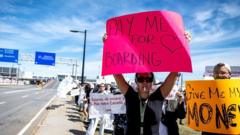The city of Philadelphia is set to return to normalcy after the largest public sector union, the American Federation of State, County and Municipal Employees District Council 33, reached a tentative labor agreement with Mayor Cherelle Parker early Wednesday morning. The eight-day strike, which began on July 1, had brought garbage collection and several other city services to a standstill, leaving trash overflowed in the streets and forcing the city to enlist private contractors to cope with the mess.
The union announced the end of the strike on social media, stating, “The Strike is Over!” The organization represents around 9,000 municipal employees, including 1,000 sanitation workers. Mayor Parker expressed her relief at reaching an agreement, highlighting the positive implications for residents, businesses, and union members alike.
During the work stoppage, various municipal functions were scaled back, including the closure of public libraries and delays in addressing infrastructure problems such as street and water main repairs. The visible accumulation of garbage exacerbated the situation, leading to unpleasant conditions for Philadelphia residents. Efforts by the city to manage the crisis through nonunion personnel faced vehement criticism over their effectiveness.
The newly negotiated contract, pending ratification by union members, includes a commendable 14 percent salary increase over the course of Parker's four-year term. Prior to the strike, workers had been under a one-year contract extension that had lapsed, leading them to push for a more stable multiyear deal. With inflation concerns lingering, union leadership underscored that previous city wage proposals were inadequate.
This was notably the first significant strike by the union in almost four decades, marking a pivotal moment in labor relations within the city's municipal framework.
The union announced the end of the strike on social media, stating, “The Strike is Over!” The organization represents around 9,000 municipal employees, including 1,000 sanitation workers. Mayor Parker expressed her relief at reaching an agreement, highlighting the positive implications for residents, businesses, and union members alike.
During the work stoppage, various municipal functions were scaled back, including the closure of public libraries and delays in addressing infrastructure problems such as street and water main repairs. The visible accumulation of garbage exacerbated the situation, leading to unpleasant conditions for Philadelphia residents. Efforts by the city to manage the crisis through nonunion personnel faced vehement criticism over their effectiveness.
The newly negotiated contract, pending ratification by union members, includes a commendable 14 percent salary increase over the course of Parker's four-year term. Prior to the strike, workers had been under a one-year contract extension that had lapsed, leading them to push for a more stable multiyear deal. With inflation concerns lingering, union leadership underscored that previous city wage proposals were inadequate.
This was notably the first significant strike by the union in almost four decades, marking a pivotal moment in labor relations within the city's municipal framework.





















